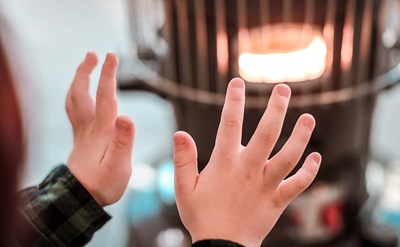Overexposure to cold can be extremely dangerous, especially for people in regions less accustomed to harsh winter weather. It is important to know the signs of hypothermia and take steps to avoid an emergency.
What is it?
Hypothermia is when your body temperature cools too fast and reaches below 95◦ F. Hypothermia typically occurs when your body is exposed to cold temperatures or cold water. It can occur even if it is warm, when your body is not able to regulate its own temperature for medical reasons.
Hypothermia prevents your organs and systems from normal function, especially your heart and brain. Without treatment, your organs can shut down completely and you could die.
What are the signs?
Initially, your body likely starts shivering to generate heat. When body temperature continues to decrease, more serious signs will follow: you will start feeling confused and drowsy, your speech will be slurred, your breathing will be shallow, and your pulse will be weak, you may lose consciousness.
The real danger is that you will not be aware that these things are happening to you because the onset is gradual and you become more confused with time. As your condition worsens, your risk becomes more elevated. Slower cognitive abilities, impaired decision making, and failing motor skills will make it harder to get out of danger during this critical time.
For example, as your senses dull, you may no longer feel cold and then decide you don’t need to put on a coat. Some people in extreme situations actually start feeling warm, peeling off their clothes and unknowingly making themselves colder.
Who is most susceptible to hypothermia?
As you age, your ability to regulate temperature is not as good as when you are younger. Children tend to lose body heat faster and do not necessarily think that they need to dress warmer.
People that struggle with mental health issues and substance use disorders may not dress appropriately for the weather and may not think to get into a warmer environment. And, certain medical conditions such as diabetes or some eating disorders may cause you not to regulate your temperature well. Certain psychotropic or sedative drugs may do the same.
Some of the most vulnerable people in our community are the most susceptible to hypothermia. Please encourage homeless patients to seek shelters in the winter, provide them with dry and warm clothing. Take the time to encourage those who may need assistance with mental health, alcohol and drug addiction as well as housing.
How can you prevent hypothermia?
- Stay warm. One way to do that is to avoid being outside for prolonged period of times in cold temperatures.
- Layer your clothes. Getting dressed appropriately is very important. Your body heat is trapped between the layers and in turn continues to keep you warm.
- Cover your hands/feet and head to prevent frostbite in the cold.
- Stay dry. If you get wet, get out of wet clothing as soon as possible. Another way to stay warm is to huddle with another person. Shared body heat will keep both of you warmer.
If you have to be outside for a prolonged period, it may be wise to have somebody with you.
Prevention is helpful but not always effective. If you see the signs, call 911. Professional treatment for hypothermia could include CPR or steps to raise body temperature such as IV fluid administration.
Warm weather is on the way. Until then, recognizing the signs of hypothermia and knowing when to go to the emergency room can save your life.
 American College of Emergency Physicians
American College of Emergency Physicians







